A shamrock in the crown
Adelina Marini, May 17, 2011
 This is one of those events for which it would be true to call them historical, although it sounds like a cliche. But for the first visit of Queen Elisabeth II in Ireland, there is no other word that can be used, aside from historical. The longest reigning British monarch will visit Ireland for the first time since the republic claimed independence from the British empire in 1921. An event for which, here in Ireland, people say that would have been impossible only a few years ago.
This is one of those events for which it would be true to call them historical, although it sounds like a cliche. But for the first visit of Queen Elisabeth II in Ireland, there is no other word that can be used, aside from historical. The longest reigning British monarch will visit Ireland for the first time since the republic claimed independence from the British empire in 1921. An event for which, here in Ireland, people say that would have been impossible only a few years ago.
Let's leave the past to historians
Generally, this is the main message that can be felt in the atmosphere in the Irish capital. Whomever you ask would tell you about the expected royal visit. He will also tell you that, in spite of the black moments in the British-Irish history, the royal family enjoys great popularity in Ireland, but not for some royalist reasons. The members of the family are being considered celebrities, the lives of whom are no less interesting than those of popular actors or musicians.
There is no press or media in Ireland that has not been dealing with the  upcoming visit every day in the past week. The most circulated daily The Irish Times came up on Saturday with a 20-page supplement on the occasion of Queen's visit. TV stations constantly go live from various spots around Dublin, they comment, analyse. People are also looking forward to the visit, although it will cause certain inconvenience to the capital because of the expected closures (announced in the very last moment and not at once) of key roads in the city.
upcoming visit every day in the past week. The most circulated daily The Irish Times came up on Saturday with a 20-page supplement on the occasion of Queen's visit. TV stations constantly go live from various spots around Dublin, they comment, analyse. People are also looking forward to the visit, although it will cause certain inconvenience to the capital because of the expected closures (announced in the very last moment and not at once) of key roads in the city.
You will rarely see or hear aggressive comments. Most are focusing on the fact that from an enemy, Britain has already turned into an ally and even a friend. A reason for this is the financial loan London gave its neighbour, on the basis of a bilateral agreement with Dublin, to help the country save its bank system, aside from the loan the country took from the European Union and the International Monetary Fund. Although it is in a period of painful austerity, the British government after all reckoned that because of the deeply rooted historical, cultural and political ties, the budget can and should afford paying 7bn pounds to the Irish banks. Not only for these reasons, David Cameron's government had decided to support his Irish counterpart also for the huge British banks' expositions to Irish debt.
Not only the people, but the rulers as well, in the face of Premier Enda Kenny, Foreign Minister Eamon Gilmore and President Mary McAleese, consider the visit a symbol of the "new era" in the relationship between the two neighbouring islands.
No indication of hostility
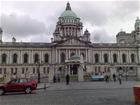 At least for the week I have been here, I did not notice any indications of that hostility that we were used to listen about in the end of last century. The peace agreement for Northern Ireland, also known as the Good Friday Accord from April 10 1998, is another step forward to relationships repair. This is why I was very much interested to see how this looks like from the perspective of Belfast so many years later. The trip by train Dublin-Belfast takes 2 hours. The delays are "monstrous" - between 15 and 30 seconds, and there are trains every two hours on this route and back. Crossing the border between Ireland and Britain (crossing over to Northern Ireland) is felt only by the change of mobile operators - from Vodafone IE to Vodafone UK in my case.
At least for the week I have been here, I did not notice any indications of that hostility that we were used to listen about in the end of last century. The peace agreement for Northern Ireland, also known as the Good Friday Accord from April 10 1998, is another step forward to relationships repair. This is why I was very much interested to see how this looks like from the perspective of Belfast so many years later. The trip by train Dublin-Belfast takes 2 hours. The delays are "monstrous" - between 15 and 30 seconds, and there are trains every two hours on this route and back. Crossing the border between Ireland and Britain (crossing over to Northern Ireland) is felt only by the change of mobile operators - from Vodafone IE to Vodafone UK in my case.
It could be naive from my point of view, but I expected when arriving in Belfast to pass passport control. Nothing like this. With my taking off the train at the Belfast Central Station I was on United Kingdom's soil and the only thing that was expected 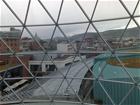 from me was to dash for the city. The only hostility I felt with my arrival in Belfast was the weather. Strong winds and heavy showers that forced me to spend a large part of my 6-hour stay in the city under shelter.
from me was to dash for the city. The only hostility I felt with my arrival in Belfast was the weather. Strong winds and heavy showers that forced me to spend a large part of my 6-hour stay in the city under shelter.
But still, it can't be that there is nothing left, can it? There is something left but it fades against the backdrop of the huge development - economical and infrastructural, which can be seen with a bare eye. But as on Sunday in Dublin there was a small group of young Irish protestesting in order the bad not to be forgotten, so one of the main lines in the Northern Ireland conflict was a major issue in some parties' political platforms in Northern Ireland for the local elections that took place in Britain on May 8.
 It is sectarianism, which marks the division between Catholics and protestants since the 14th century till the present times. According to the Workers' Party, sectarianism continues to be an issue in Northern Ireland, which has to be solved once and for good. It is no accident that the disturbing word was on one of the pre-election posters of this party.
It is sectarianism, which marks the division between Catholics and protestants since the 14th century till the present times. According to the Workers' Party, sectarianism continues to be an issue in Northern Ireland, which has to be solved once and for good. It is no accident that the disturbing word was on one of the pre-election posters of this party.
Another indication that the old enmity has started to rust is the fact that economic ties between the two parts of the smaller island thrive, at least from my perspective as a person coming from a country where a lot has changed, but in fact nothing has changed. Mobile operators offer a special service if you use roaming in Northern Ireland - free texting and talking at the same price as in Ireland if you send a text to a specific number. After all, the largest empire in the world (the British empire) progressed following the logic that turnover makes the profit, so the more accessible a service is, the more it will be used.
Besides, it is not a problem to pay in euro, in case you have missed the small detail that going to Belfast actually means you are going to another country the national currency of which is the sterling. But this is not relevant, because paying with a card is possible everywhere, even in a bus.
With the evening train back to Dublin almost all of us that traveled to Belfast in the morning met again. Obviously the weekend is the time when one can have a walk to Northern Ireland, to meet relatives or friends, who do not make a difference what is written in your passport. Or at least this is how it seems.
Security measures
In the Irish capital they have a long history in fighting terrorism, which is why 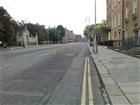 the issue of security measures is one of the leading topics for local media in the last few days. As 47-year old Seana tells me, "I have witnessed so many terrorist attacks and where was the police then. Look what they are doing right now". However, she was joking saying this to me but not when she made the remark - with what money are they going to pay for the entire operation on ensuring security, as Britain is offering a lot of help in the area of security too, as Ireland does not possess a lot of things.
the issue of security measures is one of the leading topics for local media in the last few days. As 47-year old Seana tells me, "I have witnessed so many terrorist attacks and where was the police then. Look what they are doing right now". However, she was joking saying this to me but not when she made the remark - with what money are they going to pay for the entire operation on ensuring security, as Britain is offering a lot of help in the area of security too, as Ireland does not possess a lot of things.
The question about the money is a particularly sensitive issue in Ireland nowadays, where a debate is going on about the bailout, the relations with the euro area and the impact of the situation in Greece and Portugal, about which I will tell you separately. According to the local authorities, the security operation both for the royal visit and the visit of President Barack Obama in Ireland in a week, will cost totally 30mn euro.
The most curious in terms of the security measures is the review of all the manholes 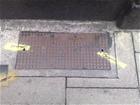 and hydrants along the royal route, as the media offer the operation to be called Operation Spanner. After being thoroughly inspected, each manhole is being "sealed" by spray-painting in the form of a spanner. In a comment with the Irish Times, titled An Irishman's Dairy, Frank McNally welcomes the fuss and the security measures, especially in his neighbourhood which is part of the royal route. Some of his pieces of advice, however, caused my genuine laughter.
and hydrants along the royal route, as the media offer the operation to be called Operation Spanner. After being thoroughly inspected, each manhole is being "sealed" by spray-painting in the form of a spanner. In a comment with the Irish Times, titled An Irishman's Dairy, Frank McNally welcomes the fuss and the security measures, especially in his neighbourhood which is part of the royal route. Some of his pieces of advice, however, caused my genuine laughter.
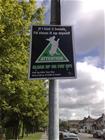 Here is what he writes on the occasion of some cosmetic work being done in the neighbourhood, like laying carpets of new grass to cover the bald spots left by winter and parked cars. "It looks well, anyway. And if the authorities need other tips on improving the area's appearance in advance of the Queen's wreath-laying, I have a suggestion that also involves memorials of a kind, although not sweet-smelling ones. No. I mean the sort laid by local dogs on the park's pathways, and on the otherwise lovely riverbank walk".
Here is what he writes on the occasion of some cosmetic work being done in the neighbourhood, like laying carpets of new grass to cover the bald spots left by winter and parked cars. "It looks well, anyway. And if the authorities need other tips on improving the area's appearance in advance of the Queen's wreath-laying, I have a suggestion that also involves memorials of a kind, although not sweet-smelling ones. No. I mean the sort laid by local dogs on the park's pathways, and on the otherwise lovely riverbank walk".
Further on the author points out that these deposits are the bane of every walker, runner (and in this city the runners are a lot), and buggy-pusher's life in this area. Indeed, I was incapable of stopping to laugh, because, as you can see from the photos, measures are obviously being taken. Yes, one can find here or there "dogs' memorials", but as a person coming from a city where me and my neighbours are competing whose street has more "dogs' memorials", Mr McNally's remarks seemed to me indeed ridiculous. But, as can be said, everyone looks at things from his perspective and probably in McNally's perspective the remark is fully justified. The man has laid it down in a long text, published in the most circulated newspaper in the country and I am sure that it will be read by the Lord Mayor of the city and measures will be undertaken.
runner (and in this city the runners are a lot), and buggy-pusher's life in this area. Indeed, I was incapable of stopping to laugh, because, as you can see from the photos, measures are obviously being taken. Yes, one can find here or there "dogs' memorials", but as a person coming from a city where me and my neighbours are competing whose street has more "dogs' memorials", Mr McNally's remarks seemed to me indeed ridiculous. But, as can be said, everyone looks at things from his perspective and probably in McNally's perspective the remark is fully justified. The man has laid it down in a long text, published in the most circulated newspaper in the country and I am sure that it will be read by the Lord Mayor of the city and measures will be undertaken.
And while I am telling you all this about the security measures, Sky News has a breaking news that a coded message had been received from an Irish Republican dissident for a bomb in Central London. This news precisely on the eve of Queen Elisabeth II's visit in Ireland maybe proves that still there are open wounds.
Selected quotes on the occasion of the royal visit
 The special supplement of The Irish Times about British monarch's visit contains also quotes of famous public people in Ireland. Here are some of them:
The special supplement of The Irish Times about British monarch's visit contains also quotes of famous public people in Ireland. Here are some of them:
Simon Harris, the youngest member of Irish Parliament (born in 1986): "The Queen is the head of state of our nearest neighbours and out of respect for that neighbour we must afford its head of state courtesy. Her visit to our country is of huge significance to the normalisation of relationships between our two countries. This prospect is both exciting and desirable. What I think of the Queen pales into absolute insignificance compared to the real historic and symbolic significance of the head of state of a neighbouring country paying the first visit to our soil in so many years".
The well-known Jerry Adams, leader of the now a political party Sinn Fein,  which was the political wing of the Irish Republican Army (IRA): "I have nothing against the Queen of England being the Queen of England. That is a matter for the people of England. But it is not the way I want Irish society to be organised. I am a republican. I believe that the people are sovereign and not subjects. I am against monarchies. I am also Irish. Although I am conscious of the sense of affinity which unionists have with the English monarch, I am offended at having to live in a partitioned Ireland with the Queen of England ruling over a part of us. I believe that a new relationship can be built between the people of Ireland and between the people of Ireland and Britain based on equality and mutual respect. Maybe this visit will speed that day".
which was the political wing of the Irish Republican Army (IRA): "I have nothing against the Queen of England being the Queen of England. That is a matter for the people of England. But it is not the way I want Irish society to be organised. I am a republican. I believe that the people are sovereign and not subjects. I am against monarchies. I am also Irish. Although I am conscious of the sense of affinity which unionists have with the English monarch, I am offended at having to live in a partitioned Ireland with the Queen of England ruling over a part of us. I believe that a new relationship can be built between the people of Ireland and between the people of Ireland and Britain based on equality and mutual respect. Maybe this visit will speed that day".
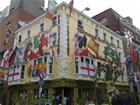 As in many other aspects, British monarch's visit will not not that much be a test but a proof of Irish people's maturity to tackle every challenge they face. And this is something I think should be taken into account by the financial markets - a country that can overcome its history, to give up the luxury it enjoyed in the last decade and to say - no problem, we are starting again from scratch - should be estimated appropriately as a trustworthy in the long-term. Because it looks ahead toward the future not to the past.
As in many other aspects, British monarch's visit will not not that much be a test but a proof of Irish people's maturity to tackle every challenge they face. And this is something I think should be taken into account by the financial markets - a country that can overcome its history, to give up the luxury it enjoyed in the last decade and to say - no problem, we are starting again from scratch - should be estimated appropriately as a trustworthy in the long-term. Because it looks ahead toward the future not to the past.
More photos from Dublin and Belfast you can see in the gallery to the right of this article.